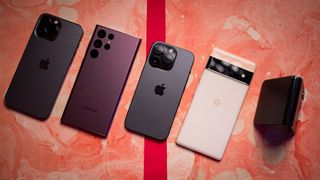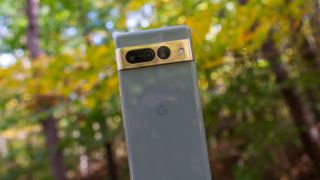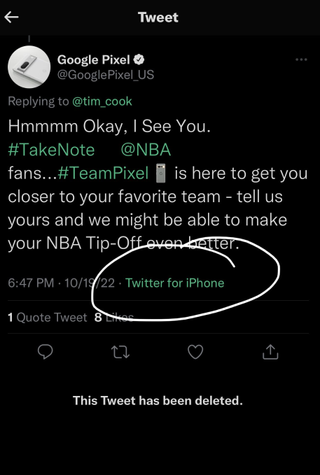'Twitter for iPhone' vs. 'Twitter for Android' stop chastising people for it, here's why
Journalists need both phones to know the industry, PR folks should probably be careful.

I never noticed this until quite recently, but people are REALLY finicky when it comes to which devices you use to tweet with on Twitter, ESPECIALLY if you work for specific companies.
To make it very clear right from the beginning, my primary phone is an iPhone. However, I’ve used Android devices for many years of my life. Do you remember back in the day when you needed to get referenced to be able to get the first OnePlus phone? I was fortunate enough to get one of these and was able to get the phone. It was one of the favorite devices I’ve ever used. Since then, I played around with different devices and again fell back to using the OnePlus 7 and was obsessed with the retractable camera.
But alas, somehow the fact that I use an iPhone and that too as my primary device has seemingly triggered a lot of people. A little over a month ago, I wrote an article about how Apple likes to announce “innovative” and new features that Android phones or watches have used for years. When the article was published I tweeted it out, and lo and behold someone took a screenshot and circled “Twitter for iPhone.” The person who tweeted the screenshot posted on Twitter: “Managing editor of android central…uses an iPhone,” and attached a cry-laughing emoji.
Managing editor of android central…uses an iPhone 🤣 pic.twitter.com/KzYNOv3oRgSeptember 23, 2022
I wasn’t upset by this, because I’ve been chastised about it on many occasions, but it did make me think about whether or not my doing this reduces my credibility for what I write about.
Now typically, I write about a lot of different things, and normally I don’t write opinion pieces. Most of my articles are fact-based and I get help from many different analysts to help me understand different concepts so that when you read my articles, you understand what the consumer-tech business is all about.
So I asked a few people to help me piece my thought process on why people get chastised for doing this on Twitter.
Michael Fisher, YouTuber known as theMrMobile, says it depends but part of the reason why someone like myself has been getting chastised is because of how niche of a website Android Central is.
Be an expert in 5 minutes
Get the latest news from Android Central, your trusted companion in the world of Android
“If you’re writing for a ‘fan site’ that historically has championed one ecosystem over another (a site that has benefited from and occasionally stoked the tribalism that reinforces that kind of ‘us vs. them’ mentality) then it certainly doesn’t come as a surprise to me that the audience reacts to a perceived ‘betrayal’ of that allegiance. I mean the place is still called Android Central, right?”
To his credit, yes Android Central did start off as a blog that champions Android products and anything in the Android ecosystem. But since then, it has grown to be a reputable site that has credible articles with commentary from reputable sources.
So does it mean then that we need to ensure we have both phones handy so that when we are doing reviews, articles, and content, we know what we are talking about?
Jacklyn Dallas, YouTuber known as NothingButTech, says it’s critical to have both phones to have the right perspective when writing in this industry.
“I actually use two phones and have two primary numbers - one for an Android device and one for an iPhone. I think within the U.S., iMessage, and FaceTime are such crucial features socially that having an iPhone is important but outside of that, I also use both because I want to make sure I’m up to date!” she says.
Virtue signaling has played a massive role here, and it’s not necessarily a good thing

The thing is that when you attach yourself to a brand, you become attached to that entire ecosystem. And there’s nothing wrong with that. I’ll be the first to say it.
Dallas notes that the attachment comes also from the amount of money people have invested into an ecosystem.
“They feel like they are part of the community and that their choice is a part of their identity that needs to be defended,” she notes.
But Carmi Levy, a technology analyst and commentator, says because of virtue signaling, it’s turned society rampant.
“I think virtue signaling around which tech devices we use has become just as rampant as which jeans or boots we wore as teenagers. While it made little logical sense - then and now - for anyone to be judged by others based on what they did or did not wear, the sad reality of modern life means we are perceived by others at least in part by the brands we choose to associate with.
"I’ve always found the relentless pursuit of fashion and branding to be a massive waste of time, money, and energy, but my opinion means little in a world where individuals are still being judged by the logo on the back of their device,” he says.
And that goes as deep as the color of our text bubbles. Are you a blue bubble or are you green?
But how many times have you heard a sarcastic comment from an iPhone user about receiving a green text bubble? It doesn’t even apply to Android phones because it doesn’t matter what message they get, it’s always a green bubble. So truly, does it even matter? Because it doesn’t.
And Levy agrees. “No one should care what brand we wear or use or tweet with.”
But alas, and when Levy told me this, I sighed deeply: “But we don’t live in an ideal world, and consumer tastes continue to be driven by the perceived value of particular brands - and our misguided belief that we improve ourselves by somehow associating with them.”
Journalism vs. public relations

It’s important to note that it really also depends on WHAT you are doing in this industry, says Levy.
He says that if you’re a regular person using your phone for regular personal activities then “it shouldn’t matter whether you use an Android, iPhone, or even an ancient BlackBerry.”
However, if you’re getting paid to promote one of these products, then that’s a different story he notes.
“If that’s the case, then you’ll need to be careful about how you use said technology while you’re engaged in said promotion,” Levy adds.
As journalists, which the reporters at Android Central are, we hold ourselves to strict journalistic standards. We are not paid to promote any product, and we give honest reviews for products.
But if you work in public relations the deal might be a bit different.
“If you’re in PR, advertising, or marketing agency and your job is to represent a specific product on behalf of a client, you’re professionally responsible for ensuring your behaviors over the course of representing said product are consistent with your messaging. In other words, if you’re getting paid to promote an iPad, then you’d best not be caught posting a tweet from an Android phone or tablet,” he says.
And surprise surprise, we know this has occurred with Google before.
The company has been caught tweeting from an iPhone. In a Tweet on October 19, the company tweeted “Hmmmm Okay, I See You. #TakeNote @NBA fans…#TeamPixel is here to get you closer to your favorite team - tell us yours and we might be able to make your NBA Tip-Off even better.”
That tweet was made on “Twitter for iPhone.”

Fisher says that if you’re in-house working for a company, blunders like these shouldn’t be happening.
And I would agree.
“Are they in-house PR, employed by a manufacturer of Android phones? Well, that's a little different -- especially if it's a manufacturer that makes a lot of noise about how they're different from or superior to Apple. In that case, yeah, I think ‘sent from iPhone’ is a pretty embarrassing combination of sloppiness and hypocrisy.
"It just reinforces the cynicism shared by a lot of folks that anyone representing a brand (whether as a PR representative or paid spokesperson) is just there for the money, that the moment they get off the stage or off the clock they dump their OnePlus or Motorola in a drawer and go back to the iPhone. That sucks,” he says.
So what’s the perspective here?

How do we help people understand that it’s okay to have different devices and be a part of different ecosystems in this industry? That’s the biggest question that I’ve had throughout this article. What does that perspective look like?
Back to what Fisher says, it’s about understanding that “carrying an iPhone at least part of the time is an essential part of the job, for those who want to cover the entire mobile landscape. Like it or not, the iPhone informs every mobile product out there. It’s irresponsible to ignore it. I used to move back into the iPhone/Apple Watch for a week every quarter, just to stay current on the platform,” he says.
Here’s that perspective. Almost everyone in my immediate family uses an Android device, I have multiple at home, and I think that it’s really important that you have the knowledge of both sides of the camp when writing articles.
And more importantly, it shouldn’t matter for those who work in the media because they need to understand full well the need to use different devices from different vendors.
Levy notes, “It’s the only way to fully understand a given product’s or solution’s strengths and weaknesses, and to legitimately be able to talk and write about them in a balanced, professional manner.”
But the thing that I think about the most is, we have paid too much attention to technology, fashion, and society in general on brands and logos.
Something Levy said really made me feel what we should all be feeling, and what I’ve been thinking about a lot:
“Our world would be a less jealous, less contentious, more peaceful place if we spent less time worrying what others think about us because of what we wear or use or drive or otherwise buy. We’d also do well to stop zeroing in on what device someone used while posting to a social media account. It really shouldn’t matter - yet human nature being as imperfect as it is, it still stubbornly does.
"In tech, it’s the same thing: we use these tools to lead relevant, purposeful lives in the digital age. What we use shouldn’t matter anywhere near as much as what we choose to produce with them. The logo is irrelevant. Our creations, and the impact they have, are all that should matter."

Shruti Shekar is Android Central's Editor-in-Chief. She was born in India, brought up in Singapore, but now lives in Toronto. She started her journalism career as a political reporter in Ottawa, Canada's capital, and then made her foray into tech journalism at MobileSyrup and most recently at Yahoo Finance Canada. When work isn't on her mind, she loves working out, reading, watching the Raptors, and planning what she's going to eat the next day.